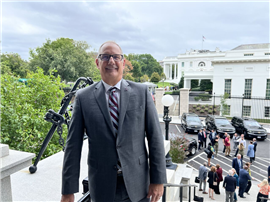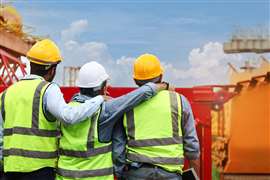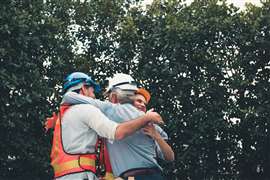US construction association contributes to White House roundtable on addiction recovery
20 September 2024
The US-based Associated Builders and Contractors (ABC) announced it participated in the “Recovery in the Workplace: Investing to Build the Workforce of Tomorrow” roundtable at the White House in Washington D.C., which brought together more than a dozen members from leading corporations, business groups and governmental leadership.
 Associated Builders and Contractors (ABC) Vice President of Health and Safety Greg Sizemore outside the White House in Washington D.C., US. (Image: ABC)
Associated Builders and Contractors (ABC) Vice President of Health and Safety Greg Sizemore outside the White House in Washington D.C., US. (Image: ABC)
The roundtable event was held on 18 September in recognition of National Recovery Month and was organised by the US Office of National Drug Control Policy, a component of the Executive Office of the President of the United States.
At the event, Greg Sizemore, ABC’s vice president of health and safety, discussed the association’s Total Human Health Initiative, a campaign meant to encourage deeper discussion between owners and workers on construction sites.
“The construction industry has long been influenced by the outdated mentality that workers should simply ‘suck it up,’ creating a barrier for employees to discuss personal challenges while on the job,” said Sizemore. “Additionally, many older construction workers turn to both legal and illegal substances as a means of coping with pain or musculoskeletal injuries accumulated over their careers.”
Plagued by having one of the highest suicide rates by industry and occupation as determined by the US Center for Disease Control and Prevention (CDC), Sizemore suggested the writing was on the wall for construction.
“We must shift our mindset and foster a caring culture that promotes not only a safe but also a healthy workplace,” said Sizemore. “This involves encouraging peer-to-peer accountability and sharing success stories – whether they involve addiction recovery or simply improving quality of life.
 Construction workers lock arms to shoulders while looking at a site. (Image: Adobe Stock)
Construction workers lock arms to shoulders while looking at a site. (Image: Adobe Stock)
“Addressing substance use and well-being must be integrated into an employer’s value proposition to every employee – and, in many cases, their families.”
At the White House event, ABC also committed to obtaining and promoting a Recovery Friendly Workplace Certification by incorporating it into its existing STEP Safety Management System and “encouraging its 67 chapters and more than 23,000 member companies to also become certified as recovery-friendly workplaces,” said ABC.
More from ABC’s Sizemore on mental health and construction
Sizemore spoke with Construction Briefing earlier this year about several topics, but principal among them was the need for better monitoring and support for employees’ mental health.
“We would be naïve if we take on the mindset that we don’t have a mental health issue in our industry,” he said.
He called his and ABC’s work to rectify some of the industry’s compounded errors regarding mental health as a “personal mission”. Their chief goal: eliminating suicide from the industry.
 Engineers embrace in celebration of a project. (Image: Adobe Stock)
Engineers embrace in celebration of a project. (Image: Adobe Stock)
“We are at the top of that list,” said Sizemore, noting its not a ladder any industy wishes to be atop.
CDC data showed that, among the 20 industry groups examined for annual rate of workers’ suicides, construction was the highest. News coverage has called it an “epidemic” a “crisis” and “alarming” and for good reason: the rate of suicide among construction and mining workers is almost double the rate of all US-based occupations.
The hard data shows that about 56 per 100,000 male construction workers succumb to suicide annually. The rate for woman is around 10 per 100,000. Adding mining and oil/gas trades, the figures jump even more: 65.6 per 100,000 suicides for men and 25.3 per 100,000 for women.
“People already think [construction is] hard. People already think it’s hot. People already think there are hazards there, and now you’re saying that you’re on top of the list of suicides in America today?” he asked rhetorically, illustrating how doing nothing to improve will compound labour issues indefinitely. “There’s a big problem there.”
Part of ABC’s mental health initiatives are programmes that help owners and workers better communicate on the topic. Eliminating the sigma of ‘shut up and work’, Sizemore said, is an enormous first step for a historically stoic workforce.
“We’re naïve to think that just because [a worker]… puts on a hardhat that whatever he had bothering him [is gone],” Sizemore said. “What we decided to do, and I believe the industry is moving in this direction… [is push] very hard internally to address that total mind, body, spirit and soul [of the employees] – all of the aspects that make up that individual – because an unhealthy person mentally is a very unsafe person on a job site.”
Need help? Know someone who does?
Contact the 988 Suicide and Crisis Lifeline if you are experiencing mental health-related distress or are worried about a loved one who may need crisis support.
- Call or text 988
- Chat at 988lifeline.org
There, you can connect with a trained crisis counsellor. 988 is confidential, free, and available 24/7/365. For more information, visit 988lifeline.org.
STAY CONNECTED



Receive the information you need when you need it through our world-leading magazines, newsletters and daily briefings.
CONNECT WITH THE TEAM








